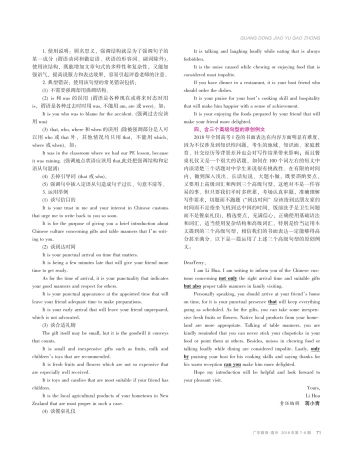2. 典型错误:使用该句型的常见错误包括:
(1)不需要强调却用强调结构。
(2)is 和was 的误用(谓语是各种现在或将来时态时用 is,谓语是各种过去时时用was, 不能用am, are 或were)。如:
It is you who was to blame for the accident.(强调过去应该用was)
(3)that, who, where和when的误用(除被强调部分是人可以用who或that外,其他情况均只用that,不能用which,where 或when)。如:
It was in the classroom where we had our PE lesson, because it was raining.(强调地点状语应该用that,此处把强调结构和定语从句混淆)
(4)丢掉引导词(that 或who)。
(5)强调句中插入定语从句造成句子过长、句意不清等。
3. 运用举例
(1)谈写信目的
It is your trust in me and your interest in Chinese customs that urge me to write back to you so soon.
It is for the purpose of giving you a brief introduction about Chinese culture concerning gifts and table manners that I’m writing to you.
(2)谈到达时间
It is your punctual arrival on time that matters.
It is being a few minutes late that will give your friend more time to get ready.
As for the time of arrival, it is your punctuality that indicates your good manners and respect for others.
It is your punctual appearance at the appointed time that will leave your friend adequate time to make preparations.
It is your early arrival that will leave your friend unprepared, which is not advocated.
(3)谈合适礼物
The gift itself may be small, but it is the goodwill it conveys that counts.
It is small and inexpensive gifts such as fruits, milk and children’s toys that are recommended.
It is fresh fruits and flowers which are not so expensive that are especially well received.
It is toys and candies that are most suitable if your friend has children.
It is the local agricultural products of your hometown in New Zealand that are most proper in such a case.
(4)谈餐桌礼仪
It is talking and laughing loudly while eating that is always forbidden.
It is the noise caused while chewing or enjoying food that is considered most impolite.
If you have dinner in a restaurant, it is your host friend who should order the dishes.
It is your praise for your host’s cooking skill and hospitality that will make him happier with a sense of achievement.
It is your enjoying the foods prepared by your friend that will make your friend more delighted.
四、含三个高级句型的原创例文
2018年全国高考I卷的书面表达在内容方面明显有难度,因为不仅涉及到知识性问题,考生的地域、知识面、家庭教育、社交经历等背景差异也会对写作结果带来影响;而且餐桌礼仪又是一个很大的话题,如何在100个词左右的短文中内谈清楚三个话题对中学生来说很有挑战性。在有限的时间内,做到深入浅出、长话短说、大题小做,既要斟酌要点,又要用上高级词汇和两到三个高级句型,这绝对不是一件容易的事。但只要我们平时多积累,考场认真审题,准确理解写作要求,切题而不跑题(“到达时间”应该指到达朋友家的时间而不是指坐飞机到达中国的时间,饭前洗手是卫生问题而不是餐桌礼仪),精选要点,充满信心,正确使用基础语法和词汇,适当使用复杂结构和高级词汇,特别是恰当运用本文提到的三个高级句型,相信我们的书面表达一定能够得高分甚至满分。以下是一篇运用了上述三个高级句型的原创例文:
DearTerry,
I am Li Hua. I am writing to inform you of the Chinese customs concerning not only the right arrival time and suitable gifts but also proper table manners in family visiting.
Personally speaking, you should arrive at your friend’s home on time, for it is your punctual presence that will keep everything going as scheduled. As for the gifts, you can take some inexpensive fresh fruits or flowers. Native local products from your homeland are more appropriate. Talking of table manners, you are kindly reminded that you can never stick your chopsticks in your food or point them at others. Besides, noises in chewing food or talking loudly while dining are considered impolite. Lastly, only by praising your host for his cooking skills and saying thanks for his warm reception can you make him more delighted.
Hope my introduction will be helpful and look forward to your pleasant visit.
Yours,
Li Hua
责任编辑 蒋小青


